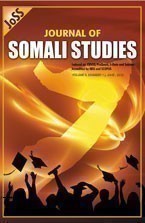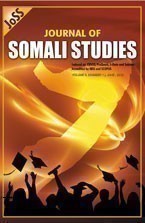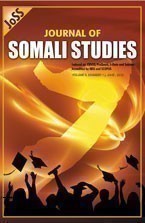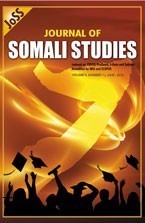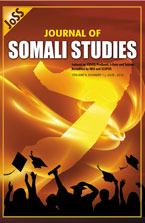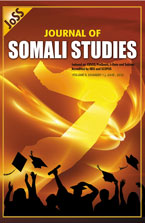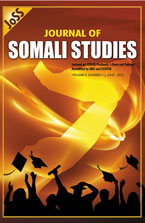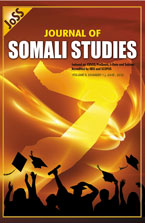
 editor@adonis-abbey.com
editor@adonis-abbey.com ![]() UK: 0207 795 8187 / Nigeria:+234 705 807 8841
UK: 0207 795 8187 / Nigeria:+234 705 807 8841
Journal Categories
Adonis-Abbey's Journal Section
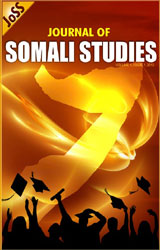
JOURNAL OF SOMALI STUDIES: Research on Somalia and the Greater Horn of African Countries
Publication Frequency: Tri-annually (Three times a year) ISSN: 2056-5674 E-ISSN: 2056-5682. SCImago Journal Ranking for 2023: Quartile: Q2; H-Index: 5; Citescore: 0.13
Journal of Somali studies (JoSS) Volume 9, Number 2, August 2022
Once again, a very warm welcome to the September edition! In this edition, we have some five (5) key articles; from taxation issue in Tanzania to the status of unemployment in fragile contexts to fiscal decentralisation in Kenya to government expenditure budget in Ethiopia to diaspora political participation in Somalia. They do make an interesting read! In the first article, titled “The impact of the fear of whistleblowing on the use of electronic fiscal devices in taxation: Evidence from Tanzania,” Adefemi Alamu Obalade, Adefemi A. Obalade, Agnes Elson and Malima Surendran Pillay tell us the impact of the fear of the whistleblowing on the use of electronic fiscal devices (EFDs) in taxation which is mandatory for businesses to use it without fail. The Tanzanian authorities also introduced whistleblowing to ensure compliance to its various directives. The key message, however, is the fact that it was confirmed that the perceived vulnerability to being repor............
Journal of Somali studies (JoSS) Volume 9, Number 1, April 2022
The April 2022 edition of the Journal of Somali Studies (JoSS) presents a number of interesting articles on the Horn and East African region, Somalia, Kenya, Ethiopia and South Sudan. For example, the article “Public Private Partnership Projects and Regional Cooperation in Horn of Africa and East African Region in the era of COVID 19 pandemic” by Nuwagaba and colleagues analyses Public Private Partnership (PPP) projects and regional cooperation during COVID 19. Due to the limited information on the role of PPPs in promoting regional cooperation, the study embarked on examining the link between PPP and regional cooperation for the Horn of Africa and east Africa region. Th article argues that the use of PPPs provides a basis for the promotion of regional cooperation among member states in this region and that these projects provide a basis for fostering regional cooperation. On the Somalia front, Jama, Ariffin and Yusof’s article “The Economic Impact of Illegal, ............
Journal of Somali studies (JoSS) Volume 8, Number 2, December 2021 Guest Editor: Dr Ibrahim Farah
This edition has some five (5) very interesting articles; three of them on Somalia, one on Ethiopia and one on Rwanda. Susan Handa examines fragility and aid on Somalia. In her article, ‘Examining Fragility and Aid in Somalia,’ she scrutinizes the basis of fragility, giving more insight on Somalia’s situation. The central theme of the paper is the fact that while aid has been fundamental in reconstructing Somalia, there has also been too much focus on security rather than development. Using secondary data, she examines the effects of the EU-led New Deal which somehow enabled a paradigm shift in international development face around Somali ownership and leadership of its transition from fragility; hence the need for a Somali-led, Somali-owned post-conflict reconstruction model. This security vs. development debate has been there since the early 1990s. And, this article is a major contribution to this debate as Somalia is yet to witness a comprehensive post-conflict rec............
Journal of Somali studies (JoSS) Volume 8, Number 1, June 2021 Guest Editor: Ibrahim Farah
In this edition, we have a number of articles for you; from Somalia to Ethiopia to the region. The articles cover a wide range of issues; both historical and contemporary. For example, there is an interesting article covering perspectives on the climate change debate linking it to migration dynamics. In this article, “Perspectives on the Rights of Climate Migrants in the Horn of Africa: A Case Study of Somalia” by Dr. Shazia Chaudhry and her student James Ouda from the famous University of Nairobi’s Institute of Diplomacy and International Studies (IDIS) in Kenya. With Somalia as a case study, the article argues that climate change has affected millions of people and that, in particular, the Horn of Africa region has been experiencing unpredictable environmental conditions resulting from climate change disasters. This is linked to permanent or temporary human migration through land degradation, recurrent and prolonged drought periods, flash floods and desertification ............
To subscribe to any of the journals, Please Email Us.




